Despite what many sources claim, drug use among teens is at its lowest level in decades. However, teen drug abuse and addiction has not disappeared completely.
Addictive drugs and substances are everywhere in our society. Some have been around for decades or even centuries, while others have just cropped up in recent years.
Treatment centers see teenage patients struggling with addiction to many different types of drugs. As a parent, it’s important to stay informed of the drug landscape and to learn how it can affect your teen if they experiment.
Teen drug abuse is a societal issue that has never gone away, but the way we look at teen addiction has become more sophisticated over the years.
Article at a Glance:
- Teen drug abuse is lower in the U.S. than in the past but still a problem in many families.
- Signs of teen drug use include having paraphernalia and behavioral changes.
- Teens often use drugs and alcohol due to peer pressure, anxiety, and curiosity.
- Alcohol, prescription drugs, and illicit drugs are commonly used by teens.
- Teen drug abuse and addiction are treatable through specially-trained practitioners and clinics.
Teen Drug Abuse Facts and Statistics
Teen drug use statistics are looking more positive than ever. Take a look at some teen drug use facts:
- Use of illicit drugs is lower than ever in the United States, at least since we started measuring. In the last five years, the use of all drugs except marijuana has decreased in teens.
- Vicodin (hydrocodone) use has dropped by over 60% among high schoolers and only 30% say it is easy to obtain, compared to 50% ten years ago
- Marijuana use has remained stable, with about 6% of 12th graders using it every day, which is about the same as five years ago
- Alcohol use and binge drinking is down to between 10-30% amongst high schoolers depending on their age
- Cigarette smoking is lower than it has ever been at around 1-3% of high schoolers, depending on age
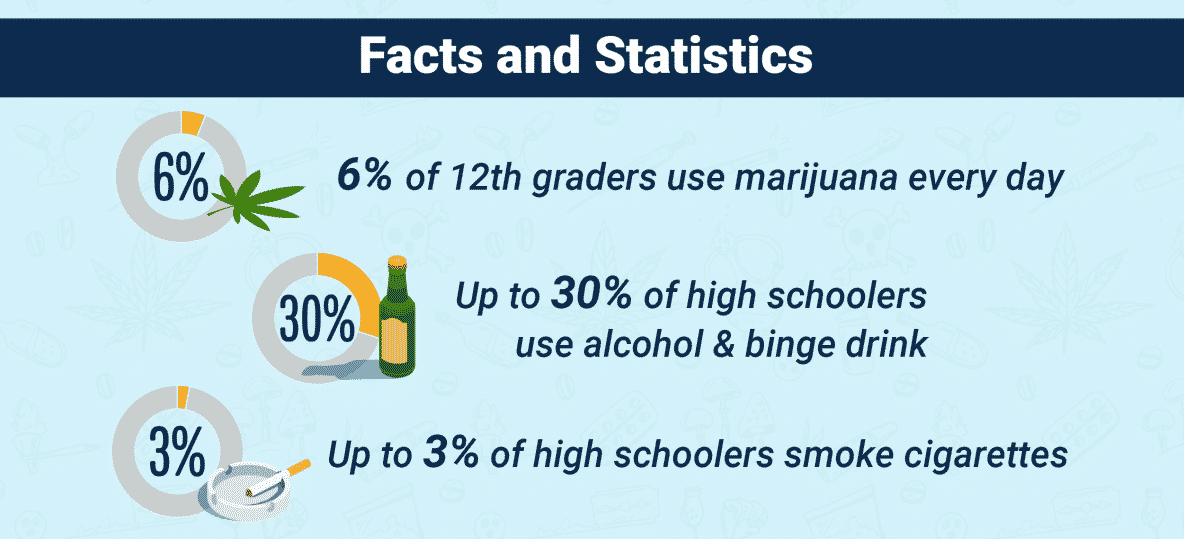
Signs of Teen Drug Use
Signs of drug use in teens refer to changes that an observer can spot and might act as a clue to confirm drug abuse. Signs can fall into a few broad categories: paraphernalia, physical signs and psychological signs.
Drug paraphernalia refers to items or tools used to ingest, hide or use different drugs. The different forms of paraphernalia vary depending on the drug and how the drug must be ingested to work. Finding paraphernalia is one of the warning signs of teen drug use.
Common pieces of paraphernalia by consumption method include:
- Injection: a rubber cord or belt for tying the arm, alcohol swabs, cotton balls for filtering, lighters, needles, spoons with burn marks, syringes.
- Smoking: glass or metal pipes, lighter (normal or torch), straws (metal or plastic for smoking), tin foil, water pipes (bongs).
- Snorting: razor blades, rolled up dollar bills, small mirror, snuff bullets, straw (metal or plastic).
If you are suspicious of a specific drug, look up symptoms of that specific drug. If you are suspicious but not sure which drug someone is abusing, general physical symptoms of drug abuse may include:
- Changes in eating or sleeping patterns
- Decreased personal grooming and worsening physical appearance
- Dry eyes, pupils which are larger or smaller than normal
- Slurred speech, tremors, poor coordination
- Sniffing or runny nose
- Strange odors on breath or clothing
- Sudden change in weight — weight gain or loss
General psychological symptoms of drug abuse may include:
- Appearing “spaced out”
- Paranoid, agitation, or fear for no apparent reason
- Periods of increased energy, nervousness, or mood instability
- Sudden lack of motivation
- Unexplained changes in attitude or personality
Signs of withdrawal start within hours to days after they last used the drug. Withdrawal symptoms will depend on which type of drug your teen is using.
You can also look for physical evidence of the drugs themselves, which are often left behind. Look for bits of marijuana (green plant material), white powder, unknown pills, and other unfamiliar materials. Even if you find evidence, be careful not to assume the worst. However, keep each piece of evidence in mind to build the bigger picture.
Along with obvious signs, drugs can cause obvious changes in behavior. While teenage years bring about personality shifts, if you notice any combination of symptoms and suspect drug abuse might be a problem, make sure to address the problem.
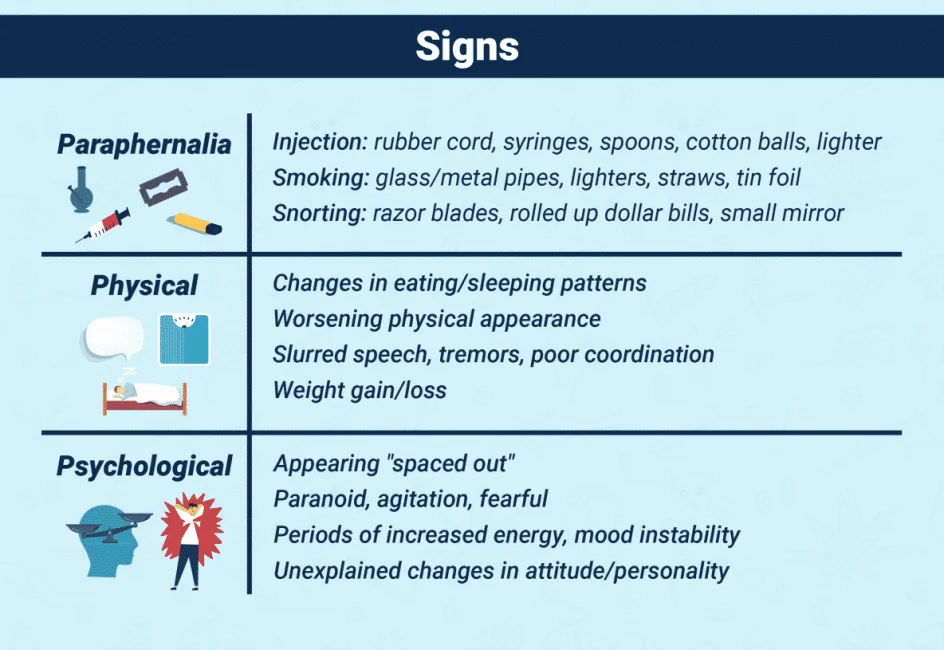
Why Do Teens Use Drugs and Alcohol
In one way or another, peer pressure is involved in around half of first-time substance use. This doesn’t imply that teens are being backed into walls and forced to use. It’s a blanket term to describe any influence from friends or classmates. Keeping up with peers and “fitting in” are subtle and often subconscious ways that teens wind up entangled with drugs and alcohol. If your child is at a party and someone hands them a beer or a joint, they may take it without even thinking. If they decide not to, they may worry about what the reaction would be, or that they’re missing out on something that everybody gets to experience. Peer pressure is a daily fixture of middle and high school life, and it helps to realize this when trying to explain your teen’s actions.
Of course, a trait shared amongst teenagers is a natural curiosity. Their minds are expanding faster than they know what to do with, and they’re learning of their own power and independence in the world. Teens may quell this curiosity by reading books, taking harder courses, joining clubs or traveling. They may also wonder about various substances — why people do them and what the experience is like. As they grow up, they see adults drink alcohol, they see advertisements for cigarettes, and they hear about drugs through movies, TV shows and word-of-mouth. By the time a teen has access to these things, the curiosity can become too much to bear. In the mind of a teen, the only way to really know might be to do it yourself.
Stress is heavy — and as we mentioned earlier, teens today are outrageously stressed out. If school responsibilities and social pressures aren’t enough, teenagers regularly face added anxiety from trouble at home, poor self image and a growing awareness of how the world works. Around 1 in 8 children develop a diagnosable anxiety disorder — a serious mental health problem that usually goes unnoticed and untreated. Stress, anxiety and depression can become debilitating for someone in the teenage years, and rather than open up to an adult, turning to drugs or alcohol can start to appear like a way out. Teens and adults alike often “self-medicate” when overwhelmed by life’s hurdles. Your teen may be struggling far more than you realize.
A teen’s decision to try drugs is rarely black and white. Young men and women out there may develop a substance problem due to a combination of factors. It would benefit you greatly to take these into account when trying to understand your teen.
-
- Genetics – your family history may explain several of your child’s traits, such as their hair color, their laugh or their allergies. It’s also a contributing factor to alcoholism, addiction to illicit drugs and several co-occurring mental disorders in teens (e.g. anxiety, bipolar disorder, depression, ADHD, etc.)
- Environment – take a close look at their school, your neighborhood, and even around your home. Children are proverbial sponges when it comes to their environment. If they grow up in a neighborhood where drug use is common, it can mold their future behaviors and points of view on the matter.
- Social Media – boys and girls today spend their entire lives on the Internet, and more than 90% of young people have social media accounts (things like Facebook, Twitter and Instagram). Research shows that exposure to the images on social media plays a major role in influencing teen behaviors like drinking and smoking. If you buy your kids a smartphone and allow them to browse the Web freely, keep in mind the breadth of what they come across and how this shapes their perspective.
- Co-Occurring Disorders – substance issues are often only half the story. Underlying mental health problems plague millions of kids, and tend to either result in (or, in part, result from) addictions to drugs or alcohol. Monitor your child’s progress in school, along with their behaviors and attitudes, for signs of a possible co-occurring mental disorder. Only a portion of the kids who struggle with these disorders get properly diagnosed and treatment for dual diagnosis. This sets them up for failure and compounding problems, not the least of which is substance abuse.
Causes of Teen Drug Abuse
While teen drug use is difficult to predict, research helps us identify the underlying causes of teen drug use. These factors can include:
- Biology: our genes play a big role in how we respond to drugs. One person might take a drug once and become hooked, while another can take it several times with no risk of addiction.
- Development: teenagers are still developing parts of the brain involved in judgment and decision-making. Drug use early in life can impair the development of parts of the brain that would normally protect us from further drug use.
- Environment: can include the influence of family or friends throughout childhood. Factors like our quality of life, presence of abuse, or exposure to different stress to play a big role in the development of drug addiction.
To understand why teens use drugs, one much look at each teenager as an individual with needs, thoughts and feelings. The reason they use drugs is as varied as to why adults use them.
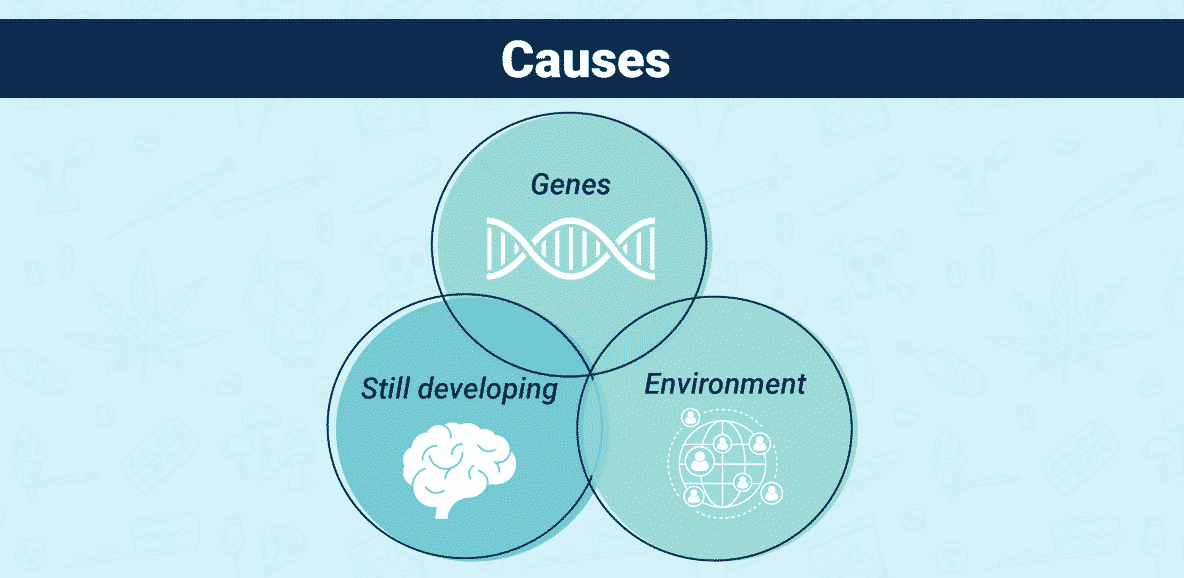
Drugs Commonly Used By Teens
Teens abuse the same drugs that adults do. Drugs of abuse range from legal to illegal, and can be natural or unnatural. Be aware of all the common drugs used by teens so you can determine behavioral flags that indicate drug abuse.
The most used drugs by teens are alcohol, cannabis and nicotine. Illicit drugs and prescription substances are less common.
How drugs are taken plays a role in the decision-making process around which drugs teens will take. In general, drugs that are easier to take like pills, drinks and smoking will be more common than snorting or injecting.
Illicit Drugs
Illicit drugs are made illegally and it is against the law to possess, distribute or take illicit drugs. Examples of teen party drugs include:
- Cocaine (available by prescription but is usually made illegally)
- Heroin (an illicit opioid)
- LSD (Lysergic acid diethylamide or acid)
- Marijuana (use in teens is increasing, but legal in some states)
- MDMA (Methylenedioxymethamphetamine or molly)
- Methamphetamine (available by prescription but is usually made illegally)
- Mushrooms with psilocybin
- Synthetic cannabis (K2 or spice)
Prescription Drugs
Prescription medications are quickly taking a bigger piece of the pie when it comes to drug abuse. Teen prescription drug abuse is common as many of the drugs are easily accessible. Some examples of prescription drugs that are often misused include:
- Central Nervous System (CNS) depressants: sleep medications, anxiety medications like benzodiazepines (Xanax, Valium, etc) and some seizure medications
- Opioids: codeine cough syrup, fentanyl, hydrocodone, morphine, oxycodone and tramadol
- Over-the-counter medicines: dextromethorphan, loperamide (a weak opioid that treats diarrhea) and pseudoephedrine (used to make methamphetamine)
- Stimulants: amphetamines or methylphenidate products
Alcohol
Teen drinking and underage drinking remain a common problem in our society. Alcohol may be difficult to shelter your child from, so make sure they know the health risks of alcohol like impaired judgment and alcohol poisoning.
In a recent study conducted by The Recovery Village, we surveyed 2,136 American adults who either wanted to stop drinking alcohol or had already tried to (successfully or not).
Research shows that people who drink before the age of 15 are four times more likely to become addicted to alcohol later in life. Among those surveyed:
- 10.1% had their first alcoholic drink at 11 years old or younger
- 37.5% had their first alcoholic drink between 12–17 years old
- 39.7% had their first alcoholic drink between 18–25 years old
- 12.6% had their first alcoholic drink at 26 years old or older
Teen alcohol abuse can be treated the same as any substance use disorder. Treatment centers offer medical detox as well as drug and alcohol addiction treatment. Many facilities are specialized and exclusively treat teen drug addiction and alcohol abuse.
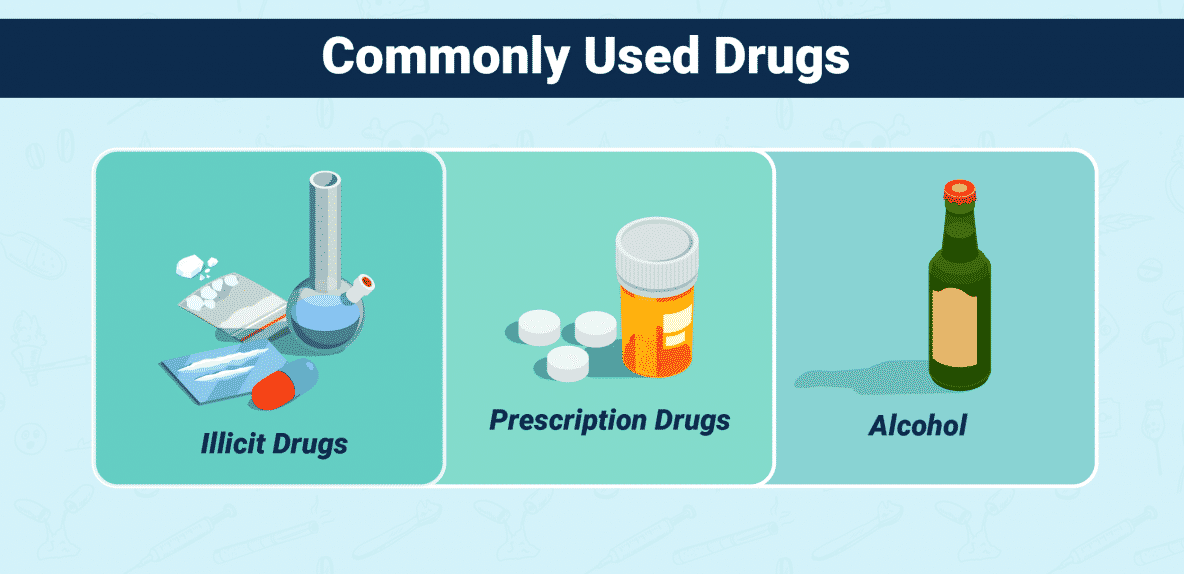
Effects of Teen Drug Use
The effects of drug abuse on teens can be permanent and damaging to themselves, friends and family. Risks can increase based on the drug of abuse, if other drugs are involved, and how long the abuse has been taking place.
Young people may feel invincible and immune to the dangers of substance use; however, they can experience the effects and consequences the same as adults.
Effects of teen drug use include:
- Arrest or juvenile detention
- Birth defects in pregnant teens
- Fired from current job or problems getting hired in the future
- Future financial problems
- Health effects
- Losing friendships or relationships with family
- Risky sexual behavior, sexually transmitted infections
- Serious illness or injury
- Suspension or expulsion from school
Lasting Effects of Drug Use on the Brain
The impact of drugs on the brain are different depending on the drug.
Certain substances cause the brain to produce more dopamine, a chemical signal that reinforces reward. Other substances block pain signals and cause euphoria. Over time, the effects of drugs on the brain can permanently alter the way your teen’s brain functions.
Drug use can have an especially great effect on the brain during youth because the brain is growing and developing.
When teens feel a drug high, they experience positive feelings that can seem to increase mood and happiness. Unfortunately, the positive effects are short-lived and come with health consequences.
Long term effects of drugs on the brain are tolerance, dependence and addiction. Brain damage from drugs can happen with heavy use even if your teen embraces sobriety later.
Is Teen Addiction Treatable?
Drug abuse and teen addiction are treatable. We now recognize addiction as a disease rather than a moral failing. Teen drug use is often acute or a short-term stress response. They may have a stressful personal life or may be curious and trying to fit in with a friend.
More rarely, drug abuse in teens is a biological problem that is tricky to overcome, and casual use can quickly snowball into a much deeper issue.
What works for your teen may be unique to them, and that’s okay. Drug addiction is a difficult medical condition to treat but, with the help of rehab professionals, you can help them recover.
Thousands of clinics and specially-trained practitioners offer substance abuse treatment for teens battling drug abuse or addiction. Treatment options for substance abuse implement therapy, counseling, medication and other proven tools designed to retrain an addict to live without drugs.
Perhaps you have tried to confront your teen’s drug problem on your own and could not help them. In this case, it may be time to consider professional treatment. Doctors and treatment specialists have spent decades working on and perfecting their methodologies, and they can help teens struggling with addiction defeat their illness.
Treatment does not guarantee your child will stop abusing drugs, but research shows that teens addicted to drugs who receive treatment are far more likely to beat their addiction than those who do not. Give your teen the best chance they have to overcome drug abuse problems.
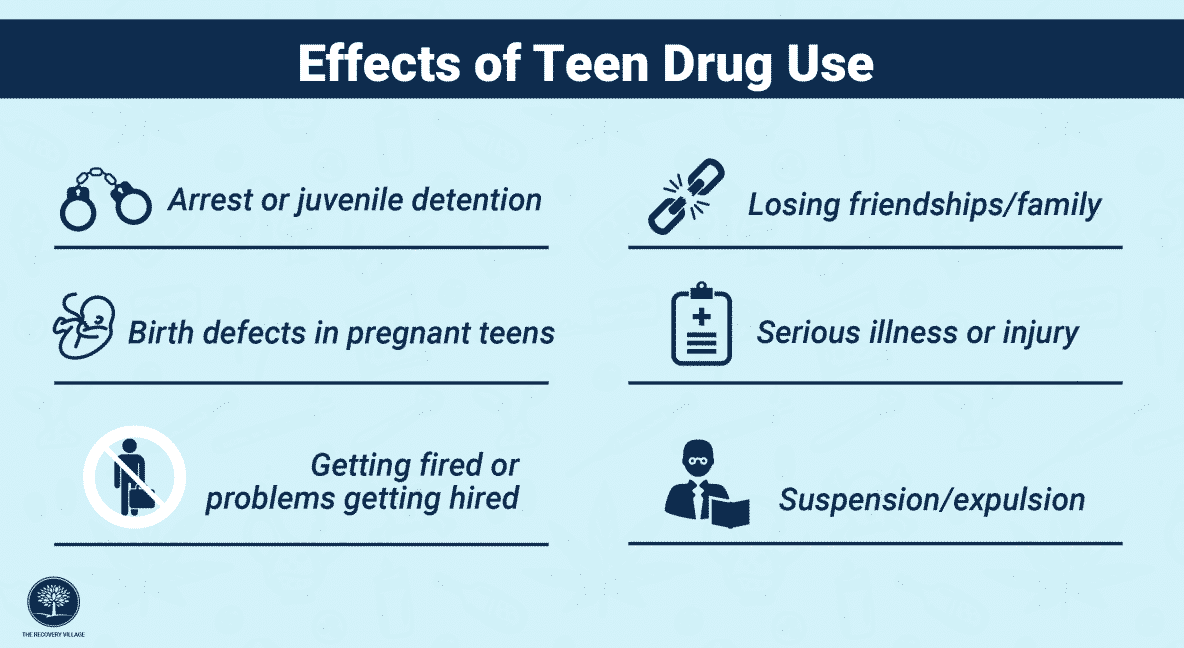
Does My Child Need Professional Treatment?
If teen addiction is a problem in your family, your first step is to reach out to a professional like your child’s doctor, guidance counselor, or one of our addiction specialists at The Recovery Village.
A professional can help you assess the situation and determine any next steps to take and if teen drug rehab is necessary. If your child needs help, a professional will go over substance abuse treatment options with you and your child.
If you notice signs that your child is abusing drugs or alcohol, take action now — most people would rather enter drug rehab for teens than drug rehab for adults down the road.


Indian Health Services. “Warning Signs of Drug Abuse and Addic[…]on | Information.” Alcohol and Substance Abuse Program, 2017. Accessed June 24, 2019.
National Institute of Health. “Monitoring the Future Survey: High Sc[…]d Youth Trends.” 2018. Accessed June 24, 2019.
National Institute of Health. “Understanding Drug Use and Addiction.” 2018. Accessed June 24,
The Recovery Village aims to improve the quality of life for people struggling with substance use or mental health disorder with fact-based content about the nature of behavioral health conditions, treatment options and their related outcomes. We publish material that is researched, cited, edited and reviewed by licensed medical professionals. The information we provide is not intended to be a substitute for professional medical advice, diagnosis or treatment. It should not be used in place of the advice of your physician or other qualified healthcare providers.